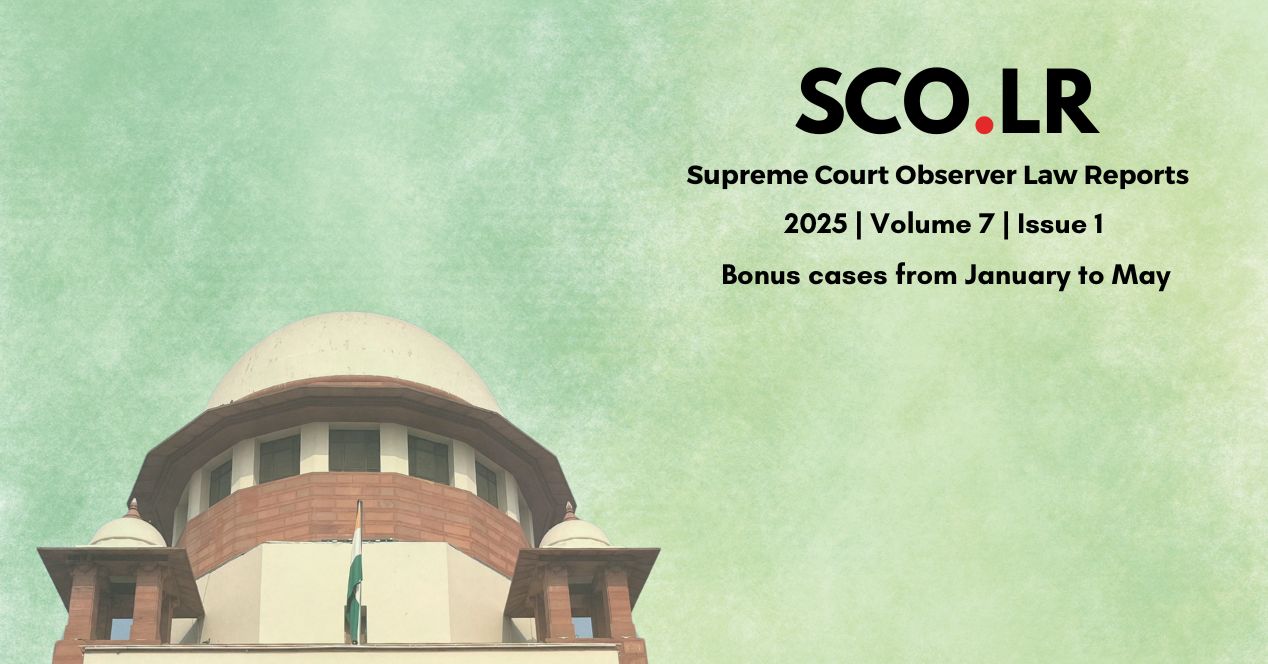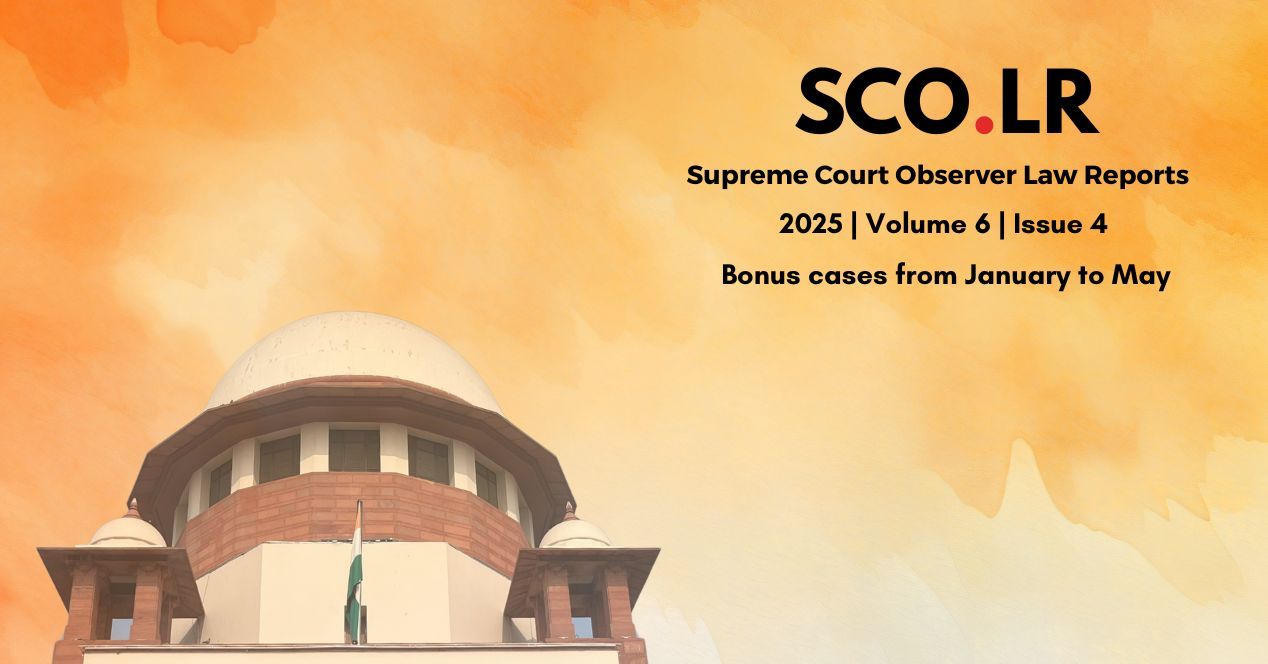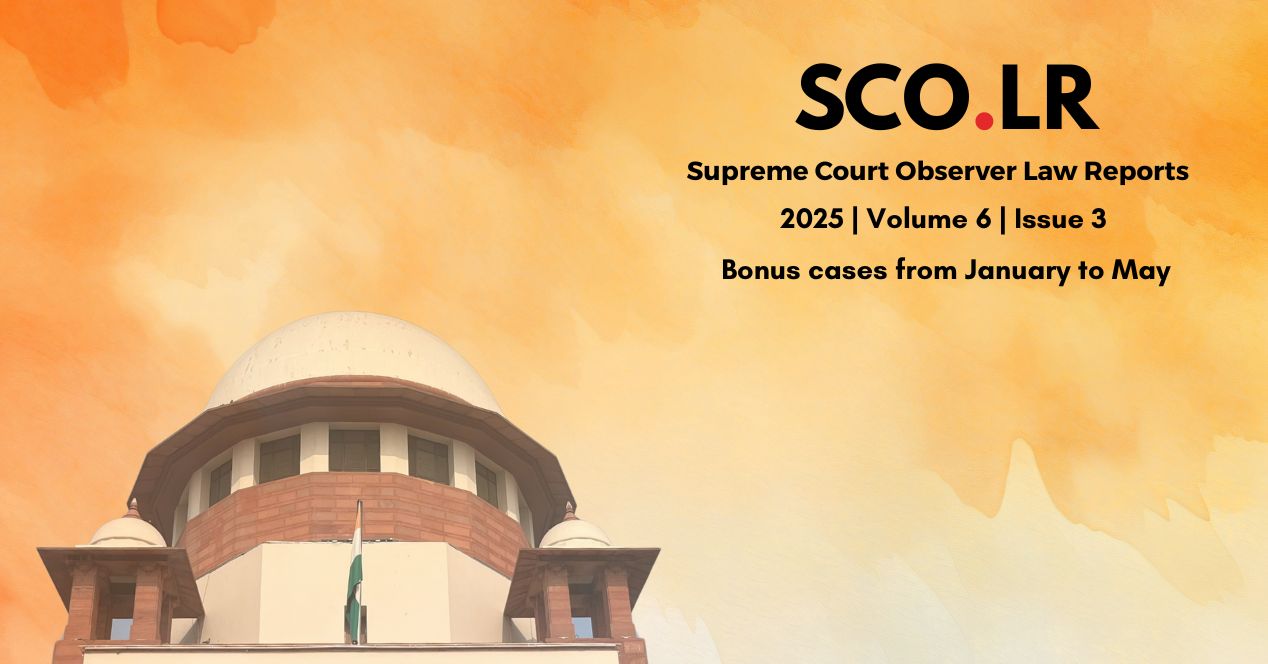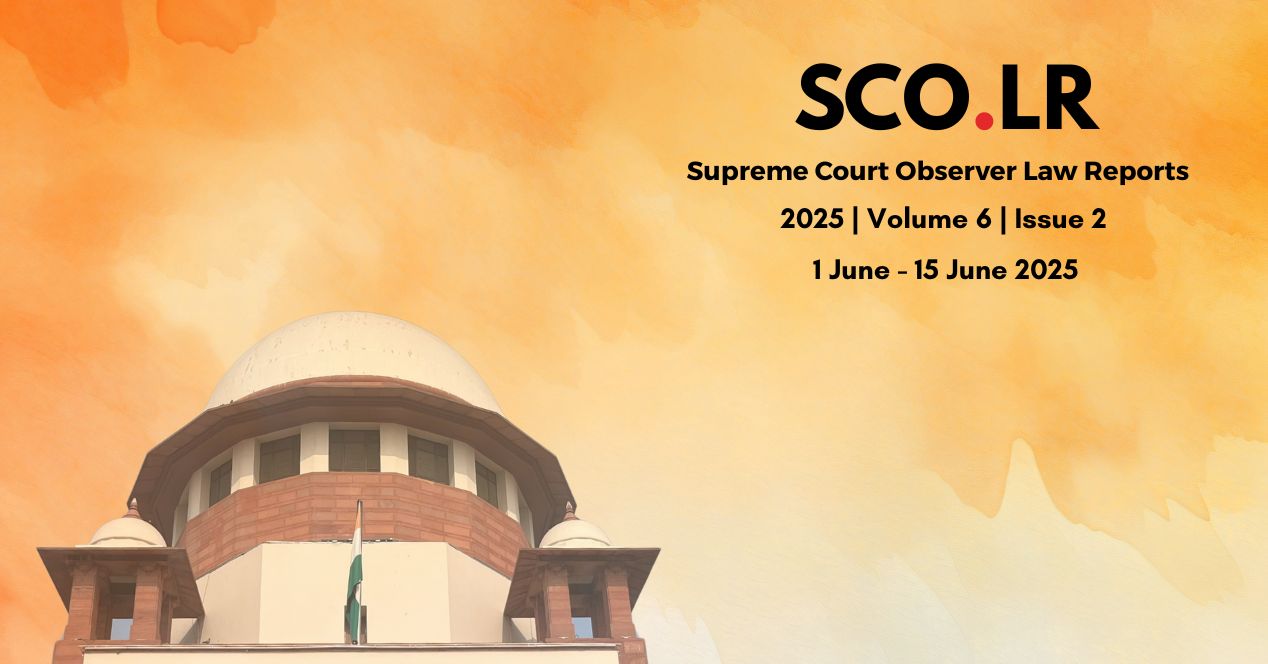Analysis
SCO.LR | 2025 | Volume 7 | Issue 2
In this Issue of SCO.LR, we bring you five bonus unmissable judgements from January to May 2025
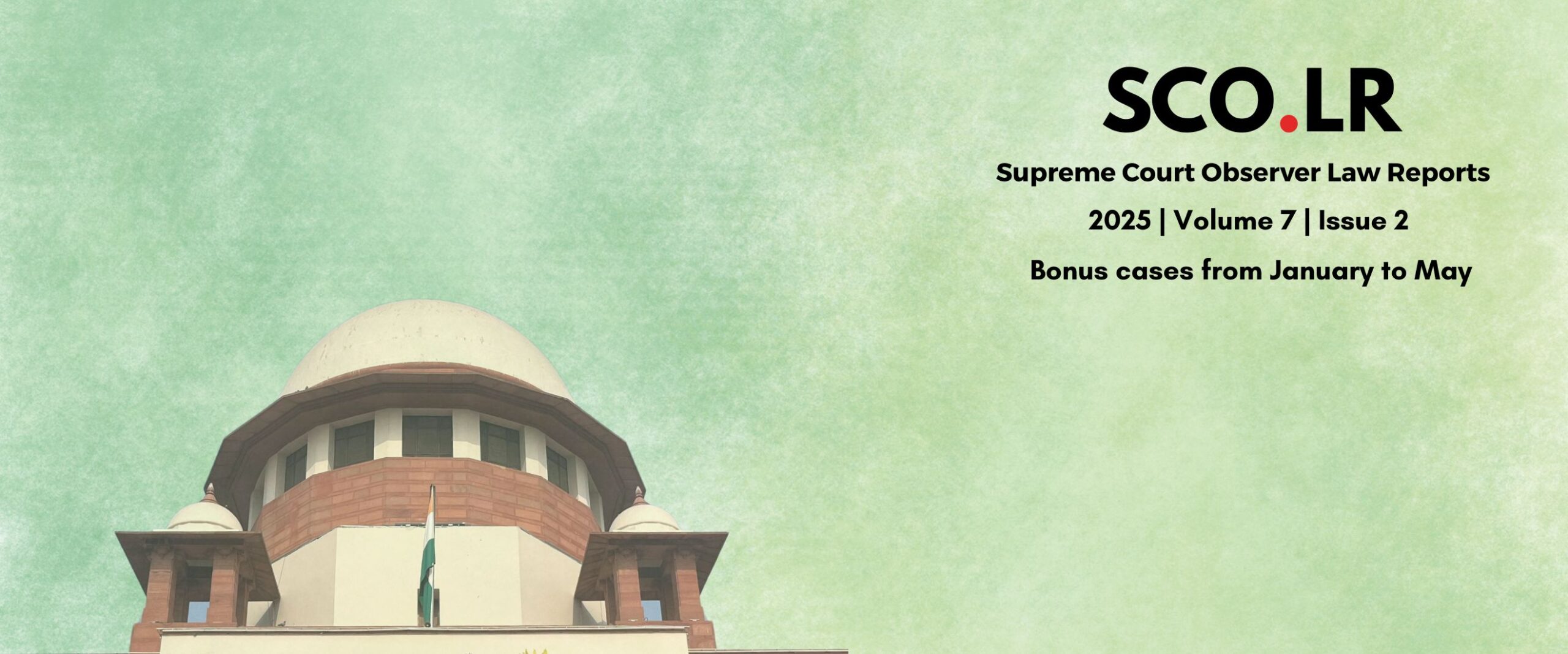
We bring you Volume 7 Issue 2 of the Supreme Court Observer Law Reports (SCO.LR). For this edition, the final one before the full court returns from the summer break, we have shortlisted five more bonus cases from January to May 2025.
In this issue, we look at Supreme Court judgements on the prosecution’s obligation to prove guilt beyond a reasonable doubt, the lack of immunity from judicial review for legislative decisions and more!
We’re delighted to share that the list of SCO.LR back issues have now been fully updated for the year so far. With this Issue, our SCO.LR page currently hosts 130 significant Supreme Court decisions from 2025. From clarifying procedural questions to laying down fresh constitutional principles, many of these rulings shape the Court’s future jurisprudence.
If SCO.LR has been a useful companion in your work over the past weeks or months, we’d love to hear from you. Drop us a note at admin@scobserver.in.
**********
The Supreme Court Observer Law Reports 2025
SCO.LR | Volume 7 | Issue 2
Bonus Judgements from January– May 2025
**********
Obligation on Prosecution to Prove Guilt Beyond Reasonable Doubt
Date: 28 January 2025
Citations: 2025 INSC 164 | 2025 SCO.LR 7(2)[6]
Bench: Justices Vikram Nath, Sanjay Karol and Sandeep Mehta
Reiterating the obligation of the prosecution to prove the guilt of the accused beyond reasonable doubt, the Supreme Court set aside the appellant’s conviction.
The appellant was convicted of murdering his brother, sister-in-law and their four children, allegedly over a land dispute. The Trial Court convicted the appellant and imposed the death penalty. The Allahabad High Court affirmed the conviction on appeal. The prosecution relied on three incriminating circumstances: motive, last seen, and recoveries made at the instance of the accused.
The Supreme Court held that the prosecution failed to present credible evidence to prove any of the incriminating circumstances. It cited the lackadaisical approach of the investigation and noted the lack of care in adhering to mandatory procedural requirements while conducting the trial. The Court relied on Sharad Birdhichand Sharda v State of Maharashtra (1984), which crystallised the duty of the prosecution to prove the chain of circumstances beyond all manner of doubt. Finding that the High Court failed to address the improbabilities and infirmities in the prosecution’s case, the Court set aside the conviction.
Keywords/phrases: Indian Penal Code, 1860–Section 302–appellant convicted for murder-death penalty–affirmed by Allahabad High Court–prosecution failed to prove beyond reasonable doubt–conviction set aside
Read the Judgement here.
Mind map**********
Legislative Decisions not Immune from Judicial Review under Article 212
Sunil Kumar Singh v Bihar Legislative Council
Date: 25 February 2025
Citations: 2025 INSC 264 | 2025 SCO.LR 7(2)[7]
Bench: Justices Surya Kant and N.K. Singh
Finding that legislative decisions are amenable to judicial review, the Supreme Court held that the petitioner’s expulsion from the Bihar Legislative Council (BLC) was disproportionate and excessive.
The petitioner was expelled from the BLC for remarks made against the Chief Minister in the House. The expulsion was challenged under Article 32. During the pendency of the petition, the Election Commission of India declared a bye-election for the vacant seat. The Supreme Court stayed the declaration of the result.
Invoking its powers under Article 142, the Supreme Court quashed the expulsion, holding that constitutional courts can review the proportionality of punishments imposed by the House. It reasoned that legislative decisions are not immune from judicial review under Article 212(1) as they do not constitute mere procedure of the House. The Court, having found the decision to be excessive and disproportionate to the act, directed his reinstatement.
Keywords/phrases: Article 32—Article 212—Member of Bihar Legislative Council expelled by Ethics Committee–challenged via writ petition–judicial review–disproportionate and excessive–expulsion set aside
Read the Judgement here.
Mind map**********
Theory of Deduction for Undeveloped Land Inapplicable Where Compensation is Based on Circle Rates under Land Acquisition Act, 2013
Madhya Pradesh Road Development Corporation v Vincent Daniel
Date: 27 March 2025
Citations: 2025 INSC 408 | 2025 SCO.LR 7(2)[8]
Bench: Justices Sanjiv Khanna and P.V. Sanjay Kumar
The Supreme Court upheld the compensation awarded under the Right to Fair Compensation and Transparency in Land Acquisition, Rehabilitation and Resettlement Act, 2013, based on the circle rate under the Indian Stamp Act, 1899, and dismissed the Madhya Pradesh Road Development Corporation’s appeals.
The case arose from land acquired in 2014 for widening National Highway 12-A in Jabalpur. The Competent Authority awarded partial compensation using both agricultural and residential rates. On appeal by landowners, the Commissioner enhanced compensation using the circle rate. The District Court and the High Court upheld the enhancement.
On appeal, the Supreme Court clarified that under Section 26(1) of the 2013 Act, which lays down criteria for determination of market value by the Collector, the highest among three criteria must be adopted. Once the circle rate is binding, adjustments like deductions apply only if reasons are recorded. It held that the “theory of deduction” applicable under the Land Acquisition Act, 1894, for undeveloped land cannot be used to reduce compensation when circle rates are decided under the 2013 Act. If the State finds circle rates excessive, the proper course is revision through a statutory process.
Keywords/phrases: Right to Fair Compensation and Transparency in Land Acquisition, Rehabilitation and Resettlement Act, 2013—Land acquisition—compensation—circle rate under Stamp Act prevails—theory of deduction not applicable under 2013 Act—state cannot seek judicial reduction without statutory revision
Read the Judgement here.
Mind map**********
Quashing of FIRs Unsustainable on Ground of Natural Justice in Parallel Administrative Action
Central Bureau of Investigation v Surendra Patwa
Date: 25 April 2025
Citations: 2025 INSC 572 | 2025 SCO.LR 7(2)[9]
Bench: Justices M.M. Sundresh and Rajesh Bindal
The Supreme Court held that High Courts erred in quashing FIRs and criminal proceedings on the ground of violation of natural justice in related administrative actions. The FIRs and proceedings were restored, and the matters remitted for fresh consideration.
In 2016, the Reserve Bank of India released the Master Directions on fraud detection, under which banks classified certain borrower accounts as fraudulent and initiated criminal proceedings. The respondents challenged both actions, and the High Courts quashed them jointly, holding that the absence of a prior hearing vitiated the entire process.
The Court held that State Bank of India v Rajesh Agarwal (2023) was misread. While administrative actions affecting civil rights require a hearing, no such hearing is needed before lodging an FIR. It clarified that criminal law operates independently of administrative decisions, and the principles of natural justice do not apply at the stage of lodging an FIR.
Keywords/phrases: RBI Master Directions (2016)—fraudulent account classification—administrative actions—natural justice—FIR registration—criminal proceedings—quashing of FIR—independent operation of criminal law
Read the Judgement here.
Mind map**********
PMLA Accused Entitled to Records Seized by ED
Sarla Gupta v Directorate Of Enforcement
7 May 2025
Citations: 2025 INSC 645 | 2025 SCO.LR 7(2)[10]
Bench: Justices Abhay S Oka, Ahsanuddin Amanullah, and Augustine George Masih
The Supreme Court held that those accused under the Prevention of Money Laundering Act, 2002 (PMLA) are entitled to a list of documents and materials which were collected by the Enforcement Directorate (ED) during investigation and form the basis of cognizance, even if the prosecution does not end up entering or relying upon them during the trial. The Court observed that this right flows from Article 21 of the Constitution, which guarantees a fair trial, including the right to defend.
In 2017, the Central Bureau of Investigation (CBI) registered an FIR against the appellants for offences of cheating and corruption under the PMLA. The accused argued that they were entitled to copies of documents seized by the ED to prepare their defence. The Special Courts and High Courts rejected their applications, holding that only relied-upon documents had to be furnished at the pre-trial stage.
The Supreme Court set aside the orders insofar as they denied the accused copies of seized documents. It directed the ED to provide true copies of seized records and a list of unrelied materials. The Court noted that Section 24 of the PMLA places a “huge negative burden” on the accused, and therefore considered it “necessary” that Section 233(3) of the Code of Criminal Procedure (now Section 256 of the BNSS), which allows the summoning of witnesses or documents, should be “liberally construed” in favour of the accused.
Key words/phrases: Prevention of Money Laundering Act—Enforcement Directorate—right to copies of seized documents—list of unrelied documents—Section 233(3) CrPC—Section 256 BNSS—fair trial—Article 21
Read the Judgement here.
Mind map
